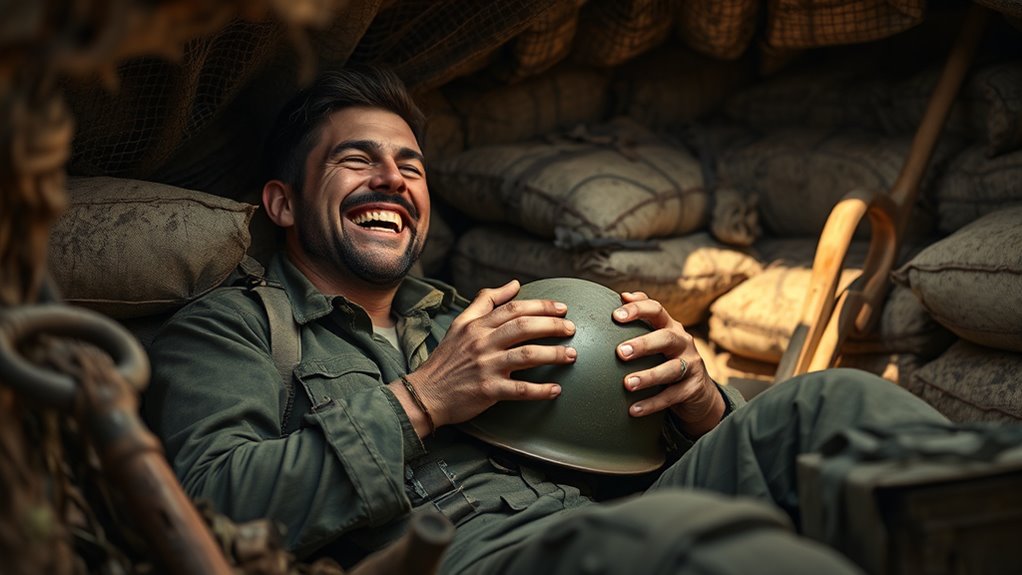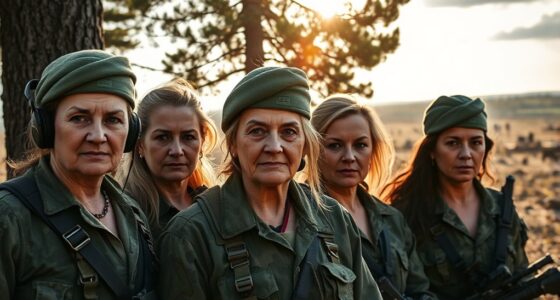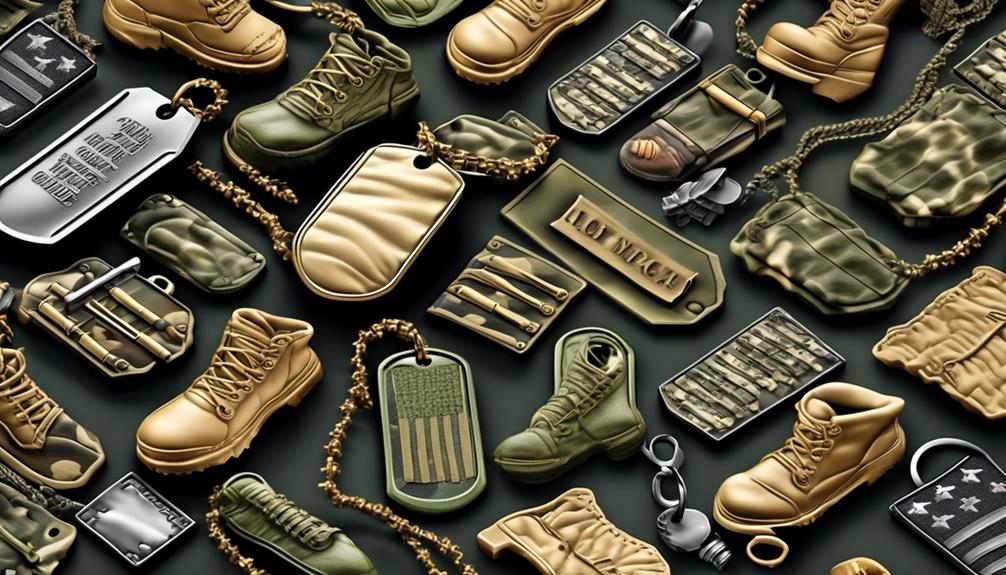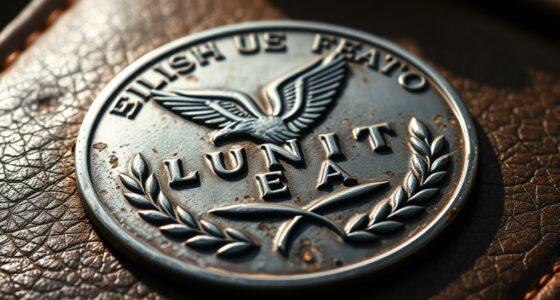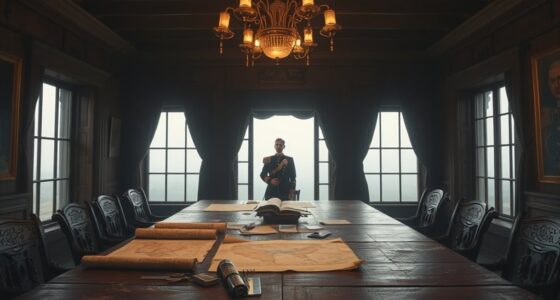During wartime, soldiers often find humor in their chaos, turning tough moments into clever jokes or lighthearted quips. You might hear them calling the battlefield a “cow pasture” or joking about “free coffee” to boost morale. These unexpected punchlines and anecdotes not only lighten the mood but also foster camaraderie. If you keep exploring, you’ll uncover more surprising ways troops used humor to cope and stay resilient.
Key Takeaways
- Soldiers used witty one-liners and jokes to boost morale and lighten tense moments in the chaos of war.
- Humorous observations and anecdotes provided brief relief, turning tension into shared stories and camaraderie.
- Famous quotes often incorporated humor or clever wordplay to make serious wartime topics more approachable.
- Humor fostered unity and resilience, creating a secret language that strengthened bonds among troops.
- Pranks and mischievous acts served as lighthearted escapes, reinforcing camaraderie and mental resilience in foxholes.
Witty One-Liners From the Battlefield
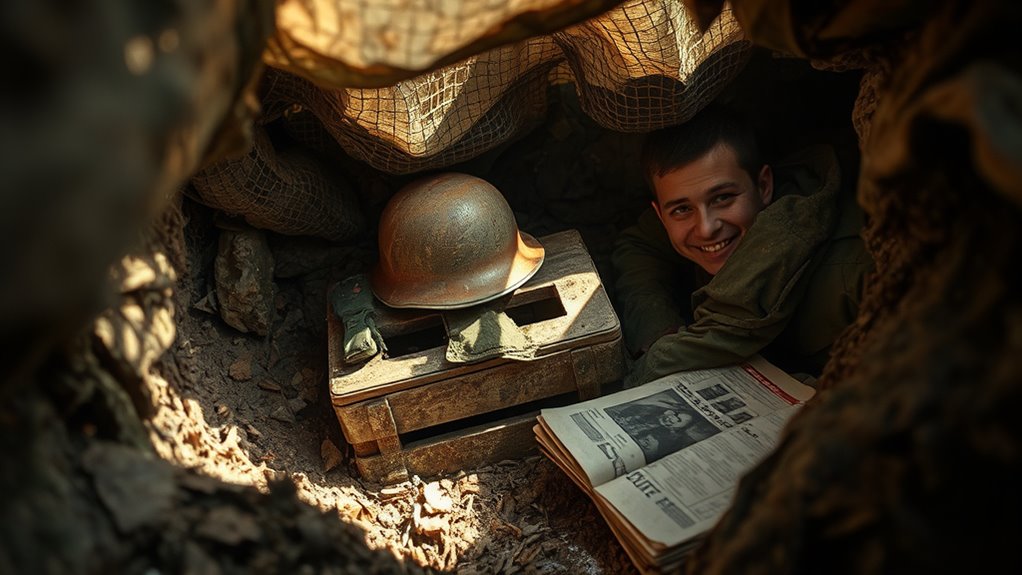
Amid the chaos of war, soldiers often found moments to lighten the mood with sharp, clever one-liners. These witty remarks, rooted in battlefield slang and military satire, served as quick comebacks or humorous jabs during tense times. You might hear a soldier quip about the chaos, calling the battlefield a “cow pasture” or joking that they’re “just here for the free coffee.” These one-liners create a sense of camaraderie and deflate the tension, even if just for a moment. They reflect a soldier’s ability to cope through humor, turning grim realities into shared jokes. The use of battlefield humor helped soldiers maintain morale and resilience in challenging conditions. Such sharp exchanges showcase the resilience of soldiers, who use humor as a weapon as much as their rifles, keeping spirits alive amid danger.
Humorous Observations That Brightened Soldiers’ Days
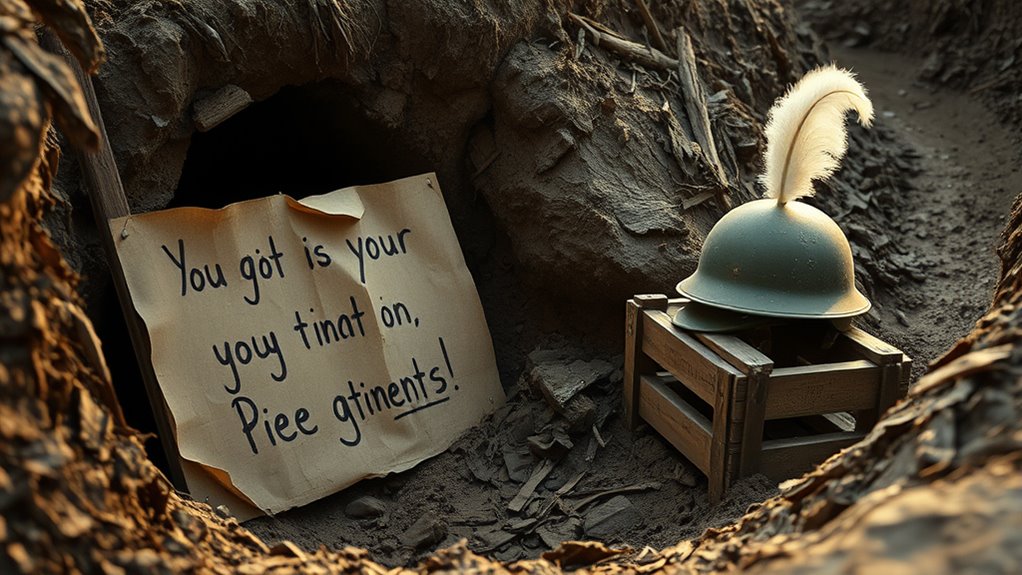
Even in the bleakest moments of war, soldiers often found humor that could lift spirits and bring brief relief from their harsh reality. These lighthearted observations offered a much-needed break from serious strategies and wartime sacrifices. Soldiers would joke about the chaos around them, making light of the hardships they faced daily. A common remark might be, “If we’re going to be shot at, let’s at least be shot at by someone with a sense of humor,” showing resilience amid adversity. Such humor served as a coping mechanism, helping soldiers stay connected and maintain morale. Interestingly, animated movies like “Up,” “Inside Out,” and “Coco” have been praised for their emotional depth and ability to bring comfort, similar to how soldiers used humor to cope during tough times. These moments reminded everyone that, even during intense struggles, laughter could be a powerful tool to endure and find hope in uncertain times.
Famous Quotes With a Comedic Twist
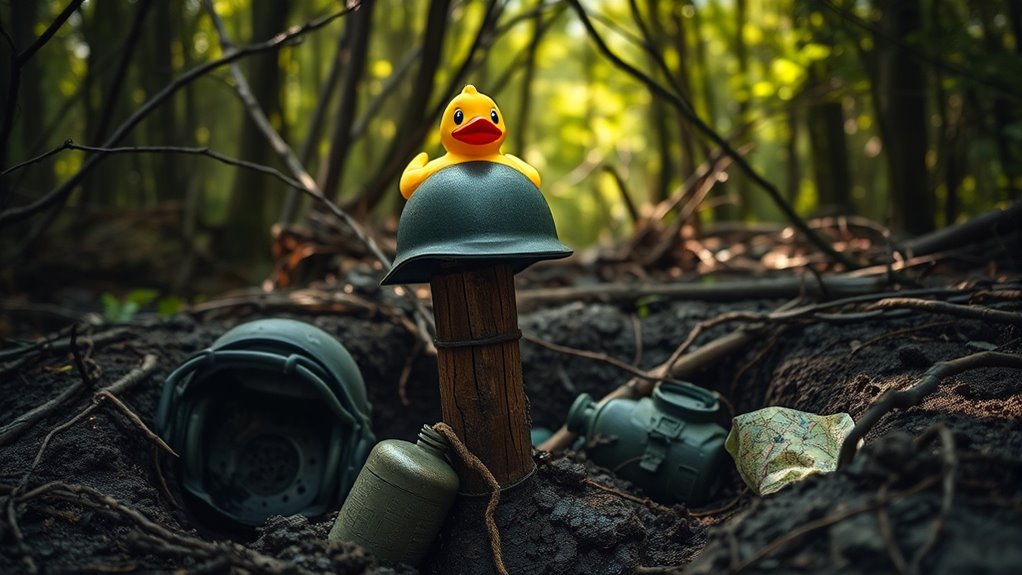
Many famous quotes from wartime figures have taken on new life when infused with humor, offering a witty perspective on serious moments. These comedic twists transform serious military strategy into memorable lines that lighten the mood. For example, a commander might quip about wartime logistics, turning complex supply chains into a punchline that soldiers remember. Such quotes highlight the absurdities of war while still acknowledging its gravity. They remind you that even in tough times, humor can be a powerful coping mechanism. These witty reinterpretations serve as morale boosters, making difficult topics more approachable. By blending cleverness with historical context, these quotes ensure that the weight of war isn’t lost, but shared with a grin. Wisdom from scribes often emphasizes the importance of truth and integrity, which can be cleverly referenced in humorous wartime anecdotes.
Clever Jokes That United Troops in Tough Times
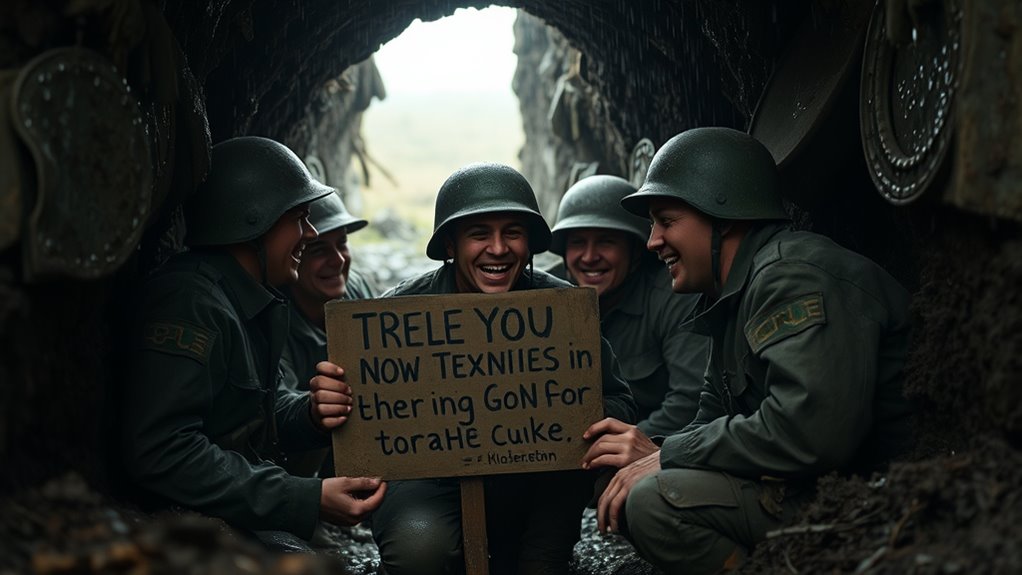
Humor has always played a crucial role in fostering camaraderie among troops, especially during the darkest moments of conflict. Clever jokes and military satire help solidify battlefield camaraderie, giving soldiers a shared sense of resilience. These jokes often serve as a secret language, cutting through tension and reminding everyone of their collective strength. Whether it’s a witty quip about the conditions or a humorous take on military life, these moments of levity create bonds that withstand hardship. Troops understand that laughter isn’t just entertainment—it’s a strategic tool for unity. By sharing clever jokes, soldiers reinforce morale and remind each other that, even in tough times, they’re in this together. Humor becomes a vital shield against the harsh realities of war. Regular use of humor and shared jokes can also help in building resilience and maintaining mental health during prolonged conflicts.
Amusing Anecdotes From Wartime Encounters
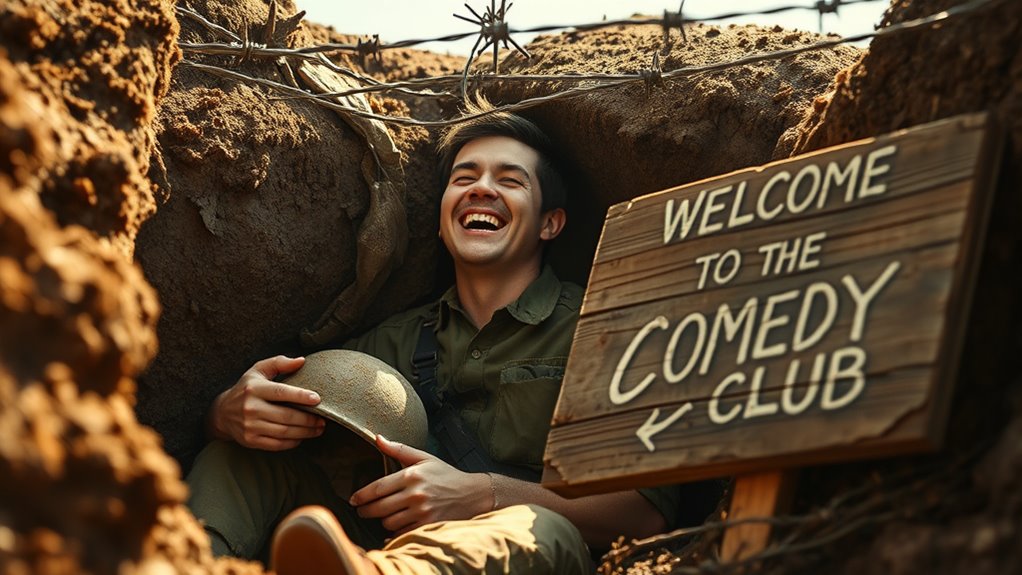
During wartime, moments of unexpected levity often emerge from the most unlikely encounters, turning tense situations into memorable stories. You might find a fellow soldier cracking a joke after a serious strategy session or sharing a humorous observation during somber reflections. These anecdotes serve as brief escapes from the gravity of war, reminding you that humor can bridge gaps and lighten heavy hearts. Such amusing encounters often involve simple, relatable moments—like a soldier joking about the chaos or a humorous misunderstanding that broke the silence. These stories highlight how even in the darkest times, humor provides relief, fostering camaraderie and resilience among troops. They remind you that laughter can be a powerful tool, even amid the seriousness of war, and that lighthearted moments can strengthen morale and unity.
Sarcastic Remarks That Defied the Darkness
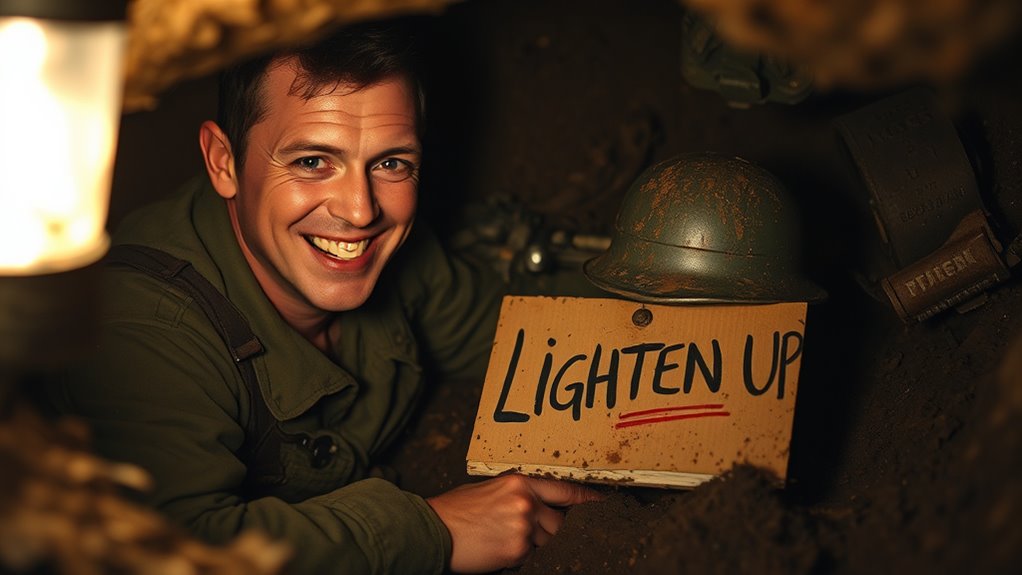
In the chaos of war, sarcastic remarks often cut through the darkness with sharp wit. You’ll notice how soldiers use clever one-liners and irony to cope, turning despair into humor. These moments of sarcasm remind us that even in the bleakest times, humor can be a powerful act of defiance. A methodical approach helps soldiers maintain focus and resilience amid chaos.
Humor Amidst Chaos
Even amid the chaos of war, soldiers found ways to inject humor into the darkness, using sarcasm as a shield against despair. They crafted battlefield poetry that blended humor with grim reality, turning tragedy into satire. Wartime satire became a way to cope, mocking authority or the absurdities of war with sharp wit. These remarks weren’t just jokes; they were survival tools, helping soldiers maintain their sanity. You might find a soldier quipping about the mud or the endless trench life, transforming grim moments into moments of levity. Humor amidst chaos wasn’t just entertainment—it was resistance. It allowed soldiers to reclaim some control, to laugh in the face of danger, and to remind themselves that even in the darkest times, humor could shine through. Recognizing the importance of morale reveals how humor served as a vital psychological refuge during wartime.
Witty War One-Liners
Have you ever wondered how soldiers used sharp wit to punch through the darkness of war? They often relied on witty one-liners, blending battlefield poetry with wartime slang to defy despair. These sarcastic remarks weren’t just jokes—they were shields against chaos. Soldiers would toss out clever quips like, “Well, that’s one for the history books,” after a close call, or “Just another day in paradise,” when facing disaster. Such phrases lightened heavy moments and fostered camaraderie. Their sharp humor turned grim reality into a shared joke, making the darkness more bearable. Interestingly, the use of witty war one-liners served as tiny acts of rebellion, proving that even in the bleakest conditions, humor could thrive and remind soldiers they weren’t alone.
Defying Darkness With Irony
Amid the chaos of war, soldiers often used biting sarcasm to push back against the darkness surrounding them. Their irony optimism served as a shield, showcasing resilience in the face of despair. By making light of grim situations, they defied the overwhelming shadows, turning hopelessness into humor. These sarcastic remarks became a way to reclaim control and brighten the bleakest moments. Instead of succumbing to fear, they used wit to highlight the absurdity of war, proving that even in the darkest times, a sharp tongue and a quick laugh could ignite a flicker of hope. Their irony not only challenged the darkness but also strengthened their resilience, proving that humor remains a powerful weapon against despair. For example, soldiers frequently employed Kia Tuning techniques to boost morale, finding humor even in the most intense situations.
Lighthearted Pranks and Mischievous Tales
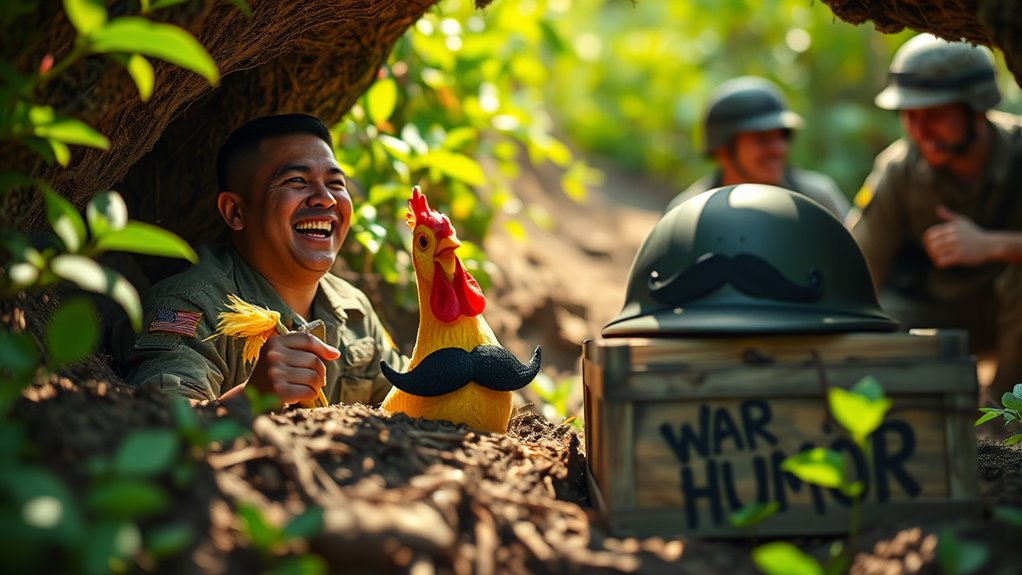
Lighthearted pranks and mischievous tales often bring unexpected humor to the tense environment of the foxhole. You might find yourself caught in prank wars, where soldiers cleverly outwit each other with mischievous acts that lighten the mood. These pranks range from simple surprises, like hiding someone’s gear, to more elaborate setups that cause laughter amid chaos. Such antics serve as a much-needed break from the stress of combat, fostering camaraderie and boosting morale. Despite the seriousness of war, these playful acts remind everyone that humor can survive even in the darkest moments. When you pull off or fall for a prank, it creates shared memories that strengthen bonds and bring a brief, welcome escape from the harsh reality around you. Regular humor also helps maintain mental resilience during difficult times.
Quips and Banter That Boosted Morale

You’ll find that witty one-liners in combat often catch everyone off guard and lighten tense moments. When soldiers share clever banter, it helps them feel more connected and resilient. These quick quips can turn a difficult day into a shared joke that boosts morale across the ranks.
Witty One-Liners in Combat
In the chaos of combat, a well-timed joke or quick-witted remark can do more than just lighten the mood—it can boost soldiers’ morale and forge a sense of camaraderie. Witty one-liners often highlight military fashion mishaps or poke fun at wartime cuisine, bringing humor to harsh realities. For example, soldiers might joke about their outdated uniforms or joke that their rations are so bad, they’d prefer the enemy’s rations instead. These quips serve as mental escapes, steadying nerves amid danger. Quick humor becomes a shared language, breaking down barriers and reminding everyone that humor, even in the worst circumstances, can be a powerful tool to keep spirits high. Laughter, after all, is a universal form of resilience.
Humor That United Troops
During tough moments in battle, soldiers often relied on humor to foster unity and strengthen their resolve. Quips and banter served as diplomatic strategies, easing tensions between troops and creating bonds beyond rank or background. These lighthearted exchanges helped navigate complex military logistics, reminding everyone that they shared a common goal. When morale dipped, soldiers would exchange jokes about supply shortages or command decisions, which boosted camaraderie and resilience. Such humor reinforced the idea that they were in this together, making even the most formidable tasks manageable. By sharing laughter, troops built trust and a sense of belonging, transforming their foxholes into spaces of collective strength. This humor became a crucial tool for maintaining morale amidst chaos.
Unexpected Humor in Wartime Letters and Diaries
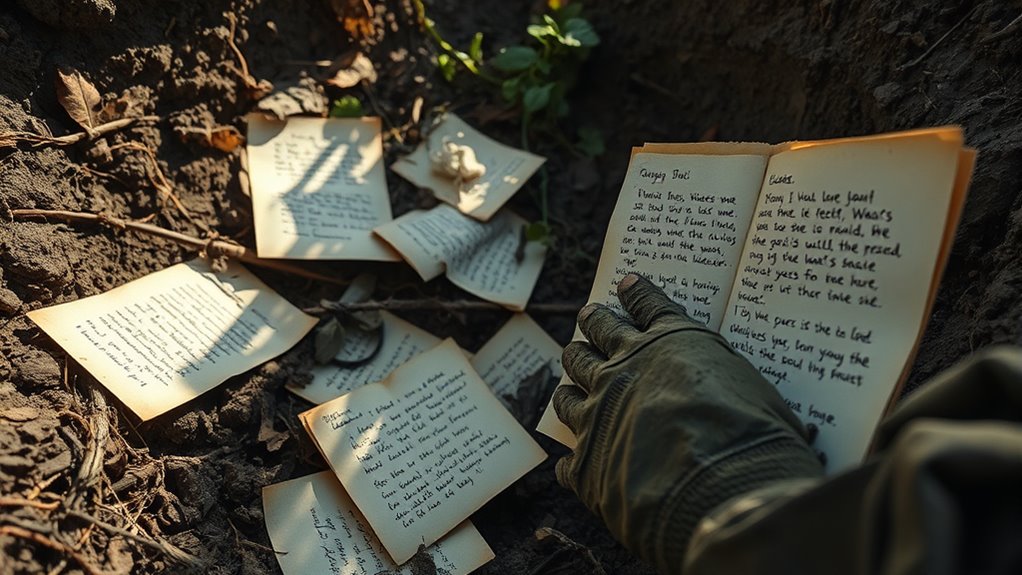
Even amid the chaos of war, soldiers and civilians alike often found moments of levity in their letters and diaries. They shared battlefield bromides that lightened tense situations and showcased wartime wit. These writings reveal humor that catches you off guard—sharp, sarcastic, and unexpectedly funny. For example, a soldier might joke about the “luxury” of a muddy trench or quip that the enemy’s artillery is just “loud music.” Such remarks serve as humorous escapes from the grim realities they faced daily. These snippets of humor highlight how soldiers used wit to cope, even if it’s wrapped in dry humor or playful sarcasm. Their words remind us that laughter, however unexpected, offered a essential mental refuge amid the horrors of war.
Comedic Resilience: How Soldiers Used Humor to Cope
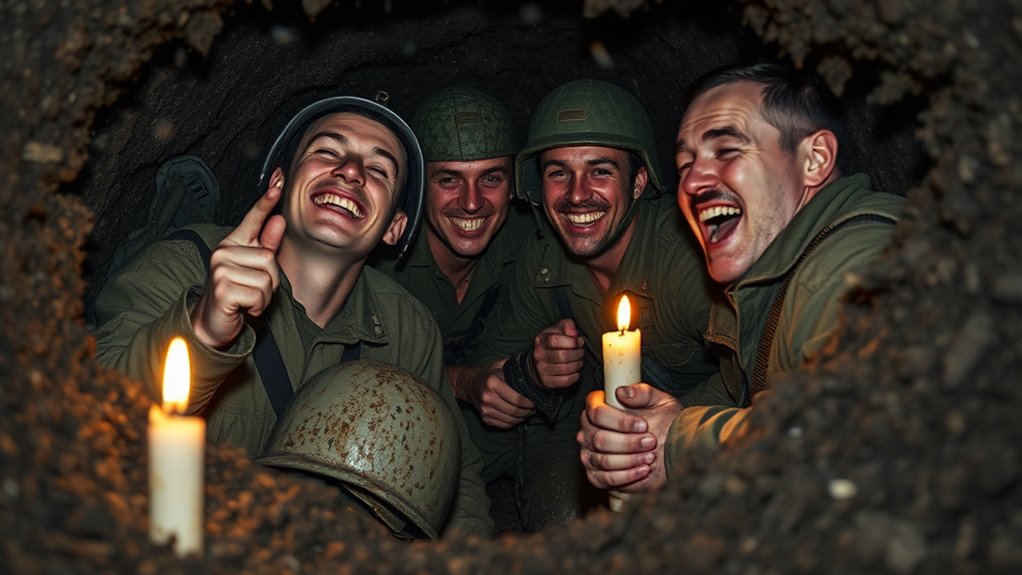
Humor served as a vital tool for soldiers to maintain their mental resilience amid the chaos of war. It fostered battlefield camaraderie, helping soldiers feel connected despite the hardships around them. Sharing a funny remark or a sarcastic joke became a morale booster, easing tension and reminding everyone of their humanity. When faced with danger and uncertainty, humor provided a mental escape, allowing you to cope with fear and stress more effectively. These lighthearted moments created bonds that strengthened your team’s resilience. By laughing together, you and your comrades found a way to endure the suffering and chaos, proving that even in the darkest times, humor could be a powerful weapon against despair.
Frequently Asked Questions
How Did Humor Influence Soldiers’ Psychological Resilience During Wartime?
Humor played a vital role in boosting soldiers’ morale and providing stress relief during wartime. When you use humor, you create a sense of camaraderie that helps you and your comrades cope with fear and uncertainty. It’s a natural way to lighten the mood, keep spirits high, and foster psychological resilience. By sharing jokes or funny stories, you can maintain mental strength and stay focused despite the harsh realities of war.
Were There Any Famous Comedians or Entertainers Involved in Wartime Morale?
You might be surprised to learn that some famous comedic entertainers played roles in wartime morale. Comedic entertainers like Bob Hope and Mickey Rooney actively boosted troop spirits through performances, visits, and broadcasts. Their humor provided comfort and a sense of normalcy amidst chaos, proving how influential comedy can be in maintaining morale. These entertainers became symbols of hope, showing that laughter truly can be a powerful tool during difficult times.
How Did Cultural Differences Impact the Humor Exchanged Among Troops?
You might notice that cultural differences affected the humor exchanged among troops, often causing misunderstandings. Language barriers made jokes hard to translate, leading to cultural misunderstandings that sometimes created confusion or offense. Despite these challenges, soldiers used humor to bridge gaps, share camaraderie, and boost morale. You’ll see that humor adapted to different backgrounds, showing resilience and a universal desire to find levity amid the chaos of war.
Did Enemy Forces Ever Use Humor as a Psychological Tactic?
Imagine facing an enemy who uses humor as a psychological tactic, turning fear into confusion. Yes, adversaries have employed humorous propaganda and jokes to undermine morale and create doubt. This unexpected tactic often caught soldiers off guard, making them question the enemy’s confidence. Humor, even in war, becomes a double-edged sword—sometimes disarming, sometimes demoralizing—proving that psychological warfare isn’t always serious; it can be surprisingly witty and effective.
What Are Some Lesser-Known Humorous Stories From Wartime That Haven’t Been Widely Shared?
You might find it fascinating that lesser-known wartime stories include hidden pranks and humorous mishaps. For example, soldiers once swapped signs to confuse the enemy or rigged radios to play funny messages. These moments show how humor helped soldiers cope with stress, boosting morale. Such stories remain hidden gems, revealing a playful side of war that’s often overshadowed by its seriousness, reminding us that laughter can prevail even in tough times.
Conclusion
You see, even in the darkest trenches, humor shines like a beacon, reminding us that laughter truly is the best armor. It’s the secret weapon soldiers wielded to lighten heavy hearts and forge unbreakable bonds. So next time life feels like a battlefield, remember these stories—they prove that even amidst chaos, a good joke can turn the tide and keep hope alive. After all, isn’t humor the hero we all need?
